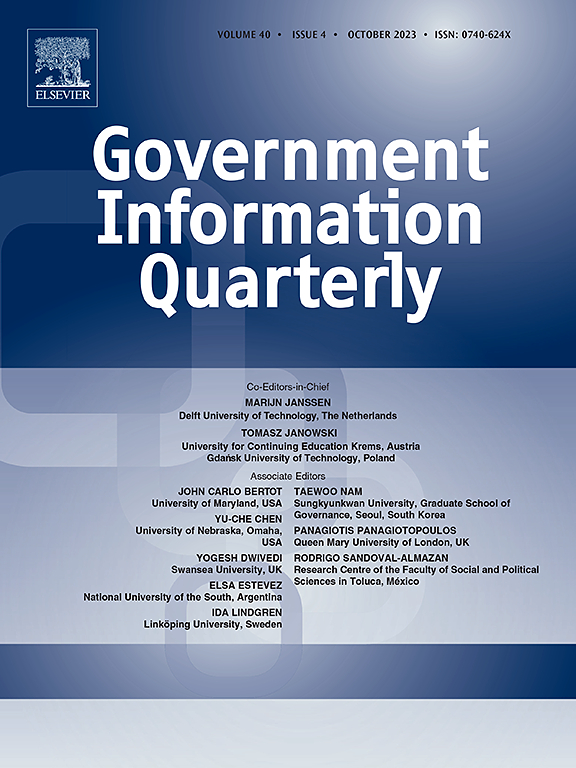数字政府研究中的数据协作:文献综述和研究议程
IF 10
1区 管理学
Q1 INFORMATION SCIENCE & LIBRARY SCIENCE
引用次数: 0
摘要
主权数据基础设施是欧洲数据战略的核心组成部分,但人们对公共管理部门如何在开放和受限数据上共享和协作知之甚少。本研究通过系统分析数字政府研究领域内关于数据协作的现有文献来解决这一差距。因此,我们通过严格的文献综述框架(包括结构主题建模)为数字政府研究做出了方法论贡献,以理解数字政府领域科学讨论的不同主题。我们提出了一个创新的数据协作框架,包括生态系统、组织和个人层面,增强我们对数据协作的多维本质的理解。我们的分析显示,虽然重点是创新和参与,但标准化和数据管理等关键方面的主题流行率正在下降,尽管它们在开发联合数据生态系统中很重要。这一全面的分析不仅揭示了当前的形势,而且为数字政府的结构化研究议程提供了信息,旨在为该领域的进步做出贡献。本文章由计算机程序翻译,如有差异,请以英文原文为准。

Data collaboration in digital government research: A literature review and research agenda
Sovereign data infrastructures are a central building block of the European Data Strategy, yet little is known about how public administrations share and collaborate on both open and restricted data. This research addresses the gap by systematically analysing the existing literature on data collaboration within the field of digital government research. We thereby make a methodological contribution to digital government research through a rigorous literature review framework that includes Structural Topic Modelling to understand the different themes of the scientific discussion in the field of digital government. We propose an innovative data collaboration framework that includes the ecosystem, the organisational, and the individual levels, enhancing our understanding of the multidimensional nature of data collaboration. Our analysis reveals that while the emphasis is on innovation and participation, critical aspects like standardisation and data management have a declining topic prevalence, despite their importance in developing federated data ecosystems. This comprehensive analysis not only sheds light on the current landscape but also informs a structured research agenda in digital government, aiming to contribute to the advancement of the field.
求助全文
通过发布文献求助,成功后即可免费获取论文全文。
去求助
来源期刊

Government Information Quarterly
INFORMATION SCIENCE & LIBRARY SCIENCE-
CiteScore
15.70
自引率
16.70%
发文量
106
期刊介绍:
Government Information Quarterly (GIQ) delves into the convergence of policy, information technology, government, and the public. It explores the impact of policies on government information flows, the role of technology in innovative government services, and the dynamic between citizens and governing bodies in the digital age. GIQ serves as a premier journal, disseminating high-quality research and insights that bridge the realms of policy, information technology, government, and public engagement.
 求助内容:
求助内容: 应助结果提醒方式:
应助结果提醒方式:


